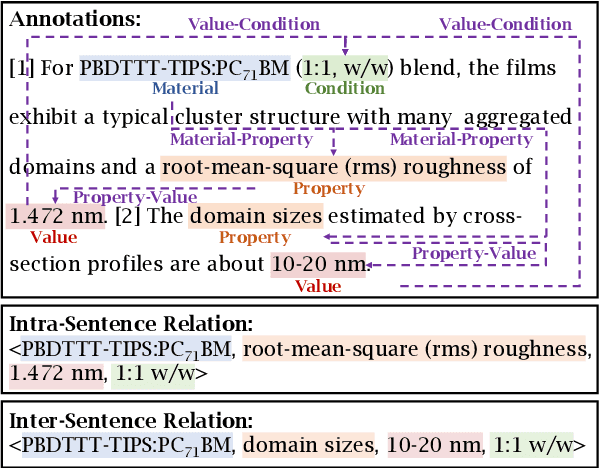Jerry Junyang Cheung
MSQA: Benchmarking LLMs on Graduate-Level Materials Science Reasoning and Knowledge
May 29, 2025Abstract:Despite recent advances in large language models (LLMs) for materials science, there is a lack of benchmarks for evaluating their domain-specific knowledge and complex reasoning abilities. To bridge this gap, we introduce MSQA, a comprehensive evaluation benchmark of 1,757 graduate-level materials science questions in two formats: detailed explanatory responses and binary True/False assessments. MSQA distinctively challenges LLMs by requiring both precise factual knowledge and multi-step reasoning across seven materials science sub-fields, such as structure-property relationships, synthesis processes, and computational modeling. Through experiments with 10 state-of-the-art LLMs, we identify significant gaps in current LLM performance. While API-based proprietary LLMs achieve up to 84.5% accuracy, open-source (OSS) LLMs peak around 60.5%, and domain-specific LLMs often underperform significantly due to overfitting and distributional shifts. MSQA represents the first benchmark to jointly evaluate the factual and reasoning capabilities of LLMs crucial for LLMs in advanced materials science.
PolyIE: A Dataset of Information Extraction from Polymer Material Scientific Literature
Nov 13, 2023



Abstract:Scientific information extraction (SciIE), which aims to automatically extract information from scientific literature, is becoming more important than ever. However, there are no existing SciIE datasets for polymer materials, which is an important class of materials used ubiquitously in our daily lives. To bridge this gap, we introduce POLYIE, a new SciIE dataset for polymer materials. POLYIE is curated from 146 full-length polymer scholarly articles, which are annotated with different named entities (i.e., materials, properties, values, conditions) as well as their N-ary relations by domain experts. POLYIE presents several unique challenges due to diverse lexical formats of entities, ambiguity between entities, and variable-length relations. We evaluate state-of-the-art named entity extraction and relation extraction models on POLYIE, analyze their strengths and weaknesses, and highlight some difficult cases for these models. To the best of our knowledge, POLYIE is the first SciIE benchmark for polymer materials, and we hope it will lead to more research efforts from the community on this challenging task. Our code and data are available on: https://github.com/jerry3027/PolyIE.
ReSel: N-ary Relation Extraction from Scientific Text and Tables by Learning to Retrieve and Select
Oct 26, 2022Abstract:We study the problem of extracting N-ary relation tuples from scientific articles. This task is challenging because the target knowledge tuples can reside in multiple parts and modalities of the document. Our proposed method ReSel decomposes this task into a two-stage procedure that first retrieves the most relevant paragraph/table and then selects the target entity from the retrieved component. For the high-level retrieval stage, ReSel designs a simple and effective feature set, which captures multi-level lexical and semantic similarities between the query and components. For the low-level selection stage, ReSel designs a cross-modal entity correlation graph along with a multi-view architecture, which models both semantic and document-structural relations between entities. Our experiments on three scientific information extraction datasets show that ReSel outperforms state-of-the-art baselines significantly.
 Add to Chrome
Add to Chrome Add to Firefox
Add to Firefox Add to Edge
Add to Edge